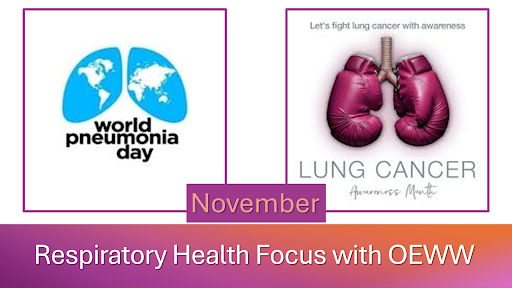Your Lung Health Matters: Respiratory Health Focus with OEWW
November shines a spotlight on respiratory health through Lung Cancer Awareness Month and World Pneumonia Day. These vital health observances remind us that protecting our lungs is essential for overall wellbeing. The Office of Employee Wellness and Wellbeing (OEWW) invites you to learn more about safeguarding your respiratory health through education, prevention strategies and proactive care.
Understanding Lung Cancer: Breaking Down the Numbers
Recent data from the 2024 Lung Health Barometer reveals some startling statistics:
- Only 28% of Americans know that lung cancer is the leading cause of cancer deaths in the U.S.
- 73% of adults haven’t discussed their lung cancer risk with their doctor.
- The survival rate has increased by over 50% in the past decade, showing hope through early detection and treatment.
Pneumonia Awareness
Here are crucial facts about this common lung infection:
- Pneumonia affects approximately 1.4 million Americans annually.
- Three main types exist: community-acquired, healthcare-acquired, and ventilator-associated.
- Most common causes include bacteria (like pneumococcus), viruses (including COVID-19, flu, RSV) and fungi.
Your Lung Health Action Plan
- Know Your Risk Factor
You may be at higher risk for lung conditions if you:
- Are 50 years or older.
- Have chronic medical conditions.
- Smoke or are exposed to secondhand smoke.
- Have a weakened immune system
- Special Note for Our Veterans. Veterans face a higher risk of developing lung cancer. If you’re a veteran, please prioritize regular lung cancer screening. Early diagnosis significantly improves survival rates.
2. Stay Current with Vaccinations
Protect yourself against preventable respiratory illnesses:
- Get your annual flu shot.
- Stay up-to-date with COVID-19 vaccines.
- Consider pneumococcal vaccination if you’re in a high-risk group.
- Discuss RSV vaccination with your healthcare provider if you’re 60+ or pregnant.
- Consider these additional strategies for Protecting Yourself This Respiratory Virus Season.
3. Practice Prevention
Maintain these healthy habits:
- Wash hands frequently.
- Cover coughs and sneezes.
- Maintain good indoor air quality.
- Stay home when sick.
- Consider mask wearing in high-risk situations.
- Take steps to quit smoking
- Quit smoking or avoid secondhand smoke: Smoking is a major risk factor for lung disease
- Contact Quit Now Virginia, which offers free telephone or web-based counseling services and Text2Quit support, self-help materials and referrals to local resources. 1-800-QUIT-NOW (1-800-784-8669) or learn more at the Quit Now Virginia Website.
- Revisit Daily Flyer article on the Great American Smoke Out and tobacco cessation programs offered by your employee health benefits plans.
4. Schedule Regular Screenings
- Discuss lung cancer screening with your healthcare provider.
- Know the warning signs: persistent cough, chest pain, shortness of breath.
- Don’t delay seeking medical attention if symptoms arise
Additional Resources:
-
Protect Yourself This Virus Season. Revisit this article for respiratory health resources for benefitted employees and those with limited/no insurance.
-
For Employees with Asthma. Consider participating in the Breathe Well, Live Well® program, the American Lung Association’s signature program for adult asthma self-management education.
- Free. Order 4 free COVID-19 tests for you and your family through covidtests.gov.
- Stay Updated: For the latest updates on lung health: Visit Lung.org
Remember: If we take care of our lungs, our lungs will take care of us.

Submitted by:
Dahlia Henry-Tett, Chief Wellness Officer (CWO), employeewellbeing@nvcc.edu
